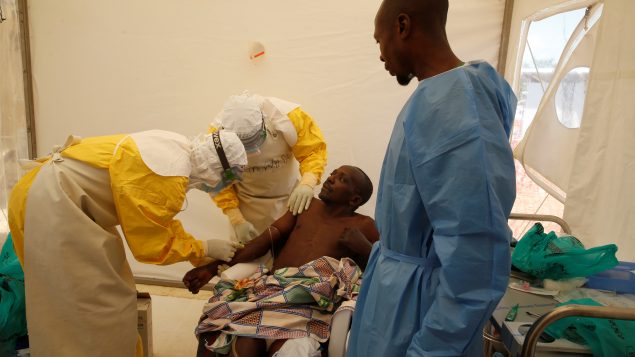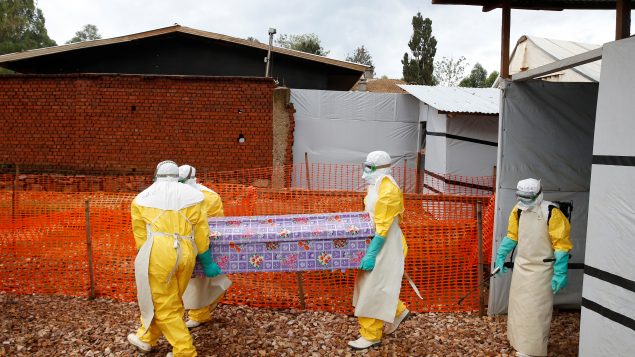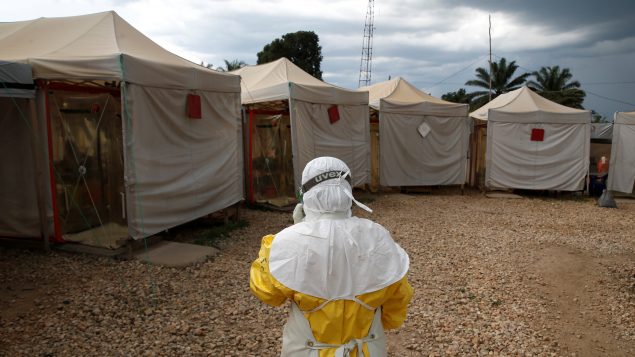As the Democratic Republic of Congo grapples with the second largest ever Ebola outbreak, the UN World Food Programme (WFP) is appealing to Canada and other donors to step up their contributions to help efforts to stop the deadly virus from spreading within DRC and to neighbouring countries.
While the World Health Organization (WHO) is the lead UN agency helping Congolese authorities in containing Ebola, WFP plays a critical role by providing food to people potentially carrying the virus, and by providing crucial logistical services, including flights to remote areas in the eastern regions of the country, said WFP Senior Partnership Adviser in DRC Arnhild Spence.
The current outbreak is concentrated in the restive eastern provinces of Ituri and North Kivu, Spence told Radio Canada International in a phone interview from capital Kinshasa.
“The situation on the ground is not good,” Spence said.
ListenThe latest outbreak of Ebola, which was declared last August and is Congo’s tenth since the virus was discovered in 1976, is believed to have killed 872 people and infected nearly 500 more in North Kivu and Ituri, Spence said.
“It is the second one we are grappling with in the course of less than one year,” Spence said.
‘Community scepticism and fear’

Medical stuff and an Ebola survivor treat Ebola patient Ibrahim Mupalalo inside the Biosecure Emergency Care Unit (CUBE) at the ALIMA (The Alliance for International Medical Action) Ebola treatment centre in Beni, in the Democratic Republic of Congo, March 31, 2019. Picture taken March 31, 2019. (Baz Ratner/REUTERS)
The fact that the outbreak happened in eastern DRC complicates the response to the crisis, she added.
“First of all, eastern DRC has been an active conflict zone for several decades with a multitude of armed groups, which makes it difficult to get access to the people who are affected by Ebola,” Spence said.
But international agencies working to contain the virus, which causes the deadly hemorrhagic fever, are also facing a high degree of “community scepticism and fear,” Spence said.
“It is a population who have felt neglected for decades,” Spence said. “So they are critical of what they perceive as the ‘sudden’ international interest in helping to stop Ebola.”
Many people feel that the international community is getting involved in the Ebola crisis out of narrow self-interest, rather than genuine concern for the well-being of the affected population, she added.
“This is one of the key challenges that this response has been faced with because without the active participation and support of the communities that are affected by Ebola you can’t actually bring it under control,” Spence said.
A crisis within a crisis

Health workers dressed in Ebola protective suits carry a coffin with the body of Congolese woman Kahambu Tulirwaho, who died of Ebola, as it is transported for a burial from the Ebola treatment centre in Butembo, in the Democratic Republic of Congo, March 28, 2019. (Baz Ratner /REUTERS)
The last few weeks have also seen a drastic deterioration of security in Ebola hotspots, further complicating the response and threatening the lives of patients as well as medical workers, Spence said.
Last week a Cameroonian epidemiologist deployed by the WHO, Dr. Richard Valery Mouzoko Kiboung, was killed in an attack on Butembo University Hospital, in North Kivu. Two other people were injured in the attack.
Health workers in Butembo threatened on Wednesday to go on strike as early as next week if authorities don’t do more to protect them.
The Ebola epidemic is a health crisis occurring within the broader humanitarian crisis in the DRC, Spence said.
“We already have a massive hunger response in this country, we are trying to help more than five million people suffering from acute hunger and malnutrition,” Spence said. “In terms of food insecurity it is the country with the largest needs after Yemen.”
For its Ebola operations WFP requires $20.5 million US for the next three months and has received just over $6 million US so far, Spence said.
The Canadian total contribution to WFP programmes in DRC in 2018 amounted to $10.3 million US. So far this year, Canada contributed $1.4 million US to the Ebola crisis, according to WFP statistics.







For reasons beyond our control, and for an undetermined period of time, our comment section is now closed. However, our social networks remain open to your contributions.